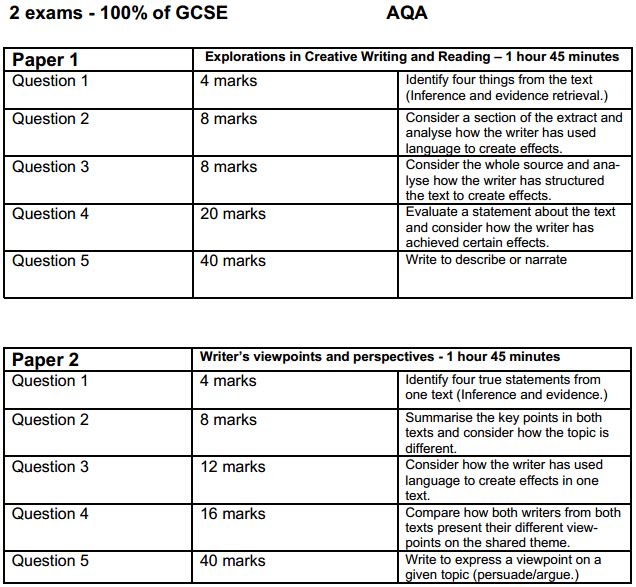Revise English Language
To view the Academy Library's resources on English Language 1. Right click this link and open our library page in a new tab. 2. Then click this link to browse our English Language resources.
- English Language Paper 1 Section A Guide
- English Language Paper 2 Section A Guide
- Writing section guide
- Year 7 curriculum map
- Year 8 Curriculum Map
Reading
- The recommendation is that you should have access to 50,000 words in your vocabulary in order to be successful at school. It is imperative that you try and learn new words and develop your vocabulary so that you can access all of your written exams.
- Reading for at least 20 minutes every day has been proven to increase your vocabulary; improve your memory; improve your spelling and grammar – all skills you will need when you take your exams.
- You must make sure you are reading material that will help you to improve, so children’s favourites such as ‘Diary of a Wimpy Kid’, and David Walliams will not help improve your vocabulary because you will probably already have learnt those words and be using them on a daily basis.
- You need to ensure you are reading books that will challenge you and teach you new things. If you can read 2 pages of a book and not come across a single word that you don’t understand – it’s too easy for you.
- In the same vein, if you read 2 pages of a book and you are finding it difficult to understand what’s going on – it’s too hard.
- Once you have found a book, you need to put aside 20 minutes a day to sit and read. Each time you come across a word you do not understand, stop. Find out what it means using a dictionary app. Now re-read the sentence and check you understand how the word has been used. Add the word to your vocabulary books and try and use it in as many different contexts as you can.
- It’s not enough to simply read pages of a book. You need to show you have understood what you have read. Try and summarise what you’ve read each day: make a note; talk to someone (or yourself) for a few minutes to explain what you have read.
- To challenge yourself further, think about what the writer is trying to achieve: are they trying to create a particular effect? Do they want you, the reader, to feel or think something? What? How do they get you to feel/think of that particular thing?
- Try and read a range of genres: drama, adventure, detective, mystery, science fiction. The more texts and genres you are familiar with, the less chance there will be of being faced with something in the exam that you have never read before.
- Read non-fiction materials: newspaper articles; diary entries; essays; editorials. Again, try and read about a range of different topics so you can consider your own ideas and opinions about the topics, as you will need to have these ideas for your writing questions.
Check out our Online Reading Hub
Writing
- Try and write creatively as often as you can: short stories; openings to stories; diary entries; poetry; song lyrics; editorials; persuasive arguments. It doesn’t matter about the topics; just write and have fun.
- Proof-read your writing. Ensure you re-read everything you write. Get into the habit of checking everything. Get someone else to double check it. Correct any errors.
- Try and use your vocabulary books and have access to a thesaurus to help you try and use a more academic and sophisticated vocabulary whenever you are writing – for any subject.
- If at home you speak a different language, try and teach someone at home a new sophisticated word in English every day.
- Revise grammatical rules: paragraphing, punctuation, word classes etc.
Gaining ideas
One of the most important things you need to have to succeed in English is ‘cultural capital’. You need to know things – know about the world around you and have an opinion on it.
- Read and watch the news regularly. Have a conversation about it and consider what your opinion is. What are other people saying about it? What are their reasons for their opinions?
- Use your other subjects – knowledge is power and the more you learn, the stronger you will be. Take every opportunity you can when in lesson, when in conversation, when watching T.V, when reading, to ask questions and learn about things you didn’t know before. If nothing else, you will be able to hold an interesting conversation with people!
Useful websites
- www.revisionworld.com
- www.bbc.co.uk
- GCSE-English.com (channel available on You Tube.)
- Mrs SPaG (channel available on You Tube)
- A useful article on how to revise for English (and other subjects): https://www.teachwire.net/news/yes-you-absolutely-can-revise-for-english-gcses-heres-how
- https://getrevising.co.uk/resources/level/gcse
- Pupils can also download the app Gojimo which offers a range of revision resources and quizzes.
- GCSE pod (available through the school website.)
Revision Guides
Useful revision guides are all available on Amazon or they can also be ordered through the school:
- Snap revision/workbooks (Collins)

 Hamstead Hall Academy
Hamstead Hall Academy